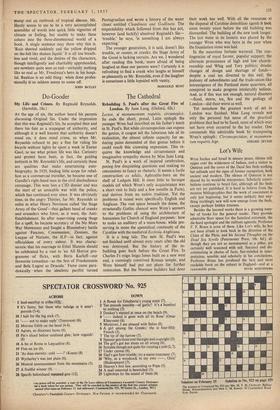Do-Gooder
My Life and Crimes. By Reginald Reynolds. (Jarrolds, 18s.)
AT the age of six, the author heard his parents discussing Original Sin. Under the impression that this was Reginald's Sin, he accepted then and there his fate as a scapegoat of authority, and although it is well known that authority doesn't mind sin, it does mind crime, so when Mr. Reynolds refused to pay a fine for riding his bicycle without lights he spent a week in Exeter Gaol, to see what prison life was like. Curiosity and protest have been, in fact, the guiding instincts in Mr. Reynolds's life, and certainly these are qualities that make entertaining auto- biography. In 1929, finding little scope for rebel- lion as a commercial traveller, he became one of Gandhi's right-hand men in the civil disobedience campaign. This won him a CID dossier and was the start of an amicable war with the police, which has continued ever since. It was obviously time, in the angry Thirties, for Mr. Reynolds to enlist in what Henry Nevinson called 'the Stage Army of the Good'—that gallant band of cranks and crusaders who form, as it were, the Anti- Establishment. So after supervising young thugs for a spell, he became secretary of the No More War Movement and fought a Bloomsbury battle against Fascism, Communism, Zionism, the League of Nations, the ILP—in fact, against officialdom of every colour. It was charac- teristic that his marriage to Ethel Mannin should be celebrated by a visit to 'an All Horror pro- gramme 'of flicks, with Boris Karloff—our favourite comedian—as the Son of Frankenstein and Bela l.ugosi as Dracula.' Fame came para- doxically when the idealistic pacifist turned
Pantagruelian and wrote a history of the water closet entitled Cleanliness and Godliness. The respectability which followed from this has not, however (and luckily) absolved Reginald's Sin— 'trouble,' he says, 'is something I am always expecting.'
The younger generation, it is said, doesn't like trouble, or causes, or cranks; the Stage Army of the Good is lacking recruits. Are we, I wondered after reading this book, more afraid of being laughed at than our parents were? Certainly it is refreshing to find a crank who laughs at himself as pleasantly as Mr. Reynolds, even if the laughter is sometimes a little lopsided with vanity.
MARIGOLD HUNT


































 Previous page
Previous page